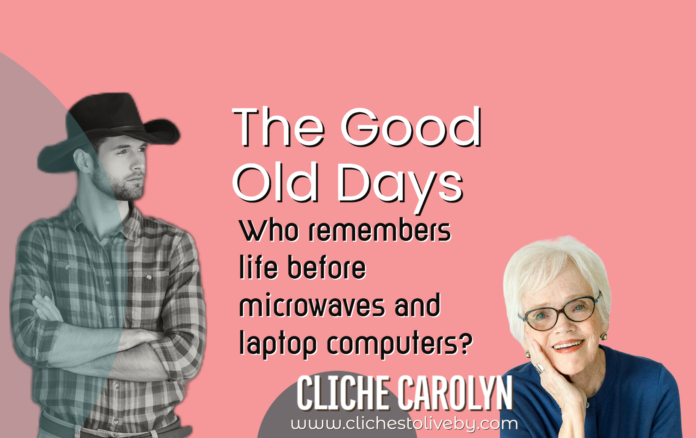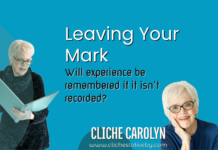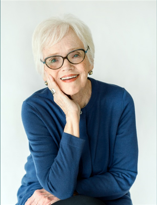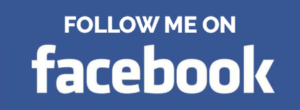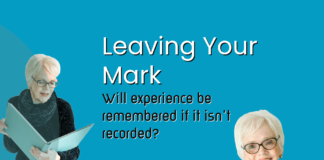Dr. Carolyn Lee reflects on a different cliché each week. Recently, in her blog “Guilty Pleasures,” she takes a look at some behaviors that she finds not shameful, but silly, and wonder why I indulge myself. This week Carolyn explores the cliché, the good old days.
Learn more about Dr. Carolyn Lee on her biography page or investigate 29 more clichés in her latest book, Keep Your Eye on the Ball And Other Clichès to Live By.
The Good Old Days
You know, of course, that old folks like to talk about how things used to be. Often, it’s because they believe the good old days were so much better than the ones they are currently experiencing. I like to talk about how things used to be, too, but not because I believe the things of the past were so much better. I just think it’s interesting—amazing, really—that they were so different. Every day I handle props that were unheard of when I was young. For instance, at this moment, I am sitting at my laptop, typing a document that I can then electronically transmit to a friend who happens to be in Australia. That still feels a little like magic to me.
In 1975, when I was just beginning the process of writing a dissertation, I had to submit the idea for my paper to a national system which would determine whether the topic I had chosen was sufficiently original. I believe that was the first encounter I ever had with a computer. This one was housed in a building on the University of Michigan campus, and it occupied the entire room. A technician fed my application into the jaws of this gigantic machine, and, after much humming and whirring, it emitted a sheet of perforated paper that granted me permission to begin writing.
I was very fortunate in that I had just received as a gift an electric Smith-Corona typewriter. Electric! Very state-of-the-art. It was so much more sophisticated than the little, red, portable Royal on which I had written my master’s thesis. Once I had filled a large box with hand-written notecards, most of which I had created at the library, I set about the task of typing my 300+ page paper. There could be no erasures on the pages of this document, so wasn’t I lucky that my electric typewriter had a “correcting ribbon”? Of course, it only worked about a third of the time, but never mind that.
Obviously, I couldn’t do any of my research on Google, so I had to resort to library periodicals and old, musty volumes of film history. Well, that was better than searching for—and not finding—the information I needed in the World Book Encyclopedia. When I was in high school, my dad bought a set of encyclopedia from a door-to-door salesman. I thought they were fabulous, and I read them like novels.
In those days (this would be in the 1950s) we had one rotary phone which was located in the sunroom—not four land-line phones that are all over the house and a cell phone I can never find. I even remember our phone number: Republic 1-4146J.
We had a Zenith television set. It had a round, twelve-inch screen that featured black and white pictures broadcast by the three existing networks: ABC, NBC, and CBS. What it did not feature was a remote control. Our other form of entertainment was a Webcor record player on which we played vinyl records of the 78-rpm variety. Fortunately, there were two one-screen movie theaters nearby—the Ozark and the Granada. They always played double bills, and the pictures changed once, sometimes twice a week. A ticket cost twenty-five cents.
Our kitchen, as I remember it, bore only the slightest resemblance to today’s center for contemporary cuisine. We had a table and chairs, a stove, a refrigerator, and a sink. No freezer, no dishwasher, no microwave, no instant pot, no Keurig coffee maker, no air fryer, no food processor. There were no paper towels. The rubber spatula hadn’t been invented. There was no such thing as plastic wrap. Our eggs and milk were delivered by a guy in a truck.
Once, when I was renting a car, the salesperson asked me if I knew how to drive a stick-shift. “My dear,” I wanted to say, “when I learned to drive, there wasn’t anything but a stick-shift.” So, yes, I know how to manually change gears. Also, when I bought my first car, a stick-shift Volkswagen bug, a gallon of gas cost thirty-one cents, and I could fill my tank for three dollars.
Fresh from my master’s degree, I got a job teaching high school English in St. Louis. My salary was $5,000 a year. After one year of teaching, I had saved enough money for my sister and me to go to Europe. We sailed on the S.S. France, and our transatlantic ticket put us back $426.85 apiece. We were gone two months, and we spent less than I recently spent on a two-week trip to Ireland. We were aided in our quest for inexpensive food and accommodations by Arthur Frommer’s book, Europe on $5 a Day.
In some ways, they were the good old days. Life was definitely simpler and less expensive. But I’m trying to imagine my current life without my cell-phone or my lap-top. I’m trying to remember doing research without the internet. I’m convinced that some of my friendships with people who live on the other side of the country would founder if we could not text each other regularly. No, it would be nice if gas cost thirty-one cents a gallon and movie theaters still played double-bills, but there’s a lot to be said for NOW.
Want to Read More?
Check out Dr. Carolyn Lee’s blogs on her website, she features a new cliché each week or you can order her new book, Keep Your Eye on the Ball And Other Clichès to Live By. Want to know more about the woman behind the words? Read more about Carolyn here. We hope you enjoyed this article learning more about the cliché, the good old days.
